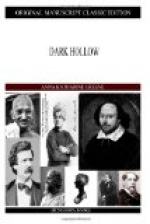Mr. Black’s eyes sparkled with admiration. He could not have used this method with the lad, but he recognised the insight of the man who could. Bribes were a sign of weakness, so were suggested force and counter-attack; but scorn—a calm ignoring of the power of any one to seriously shake Oliver Ostrander’s established position— that might rouse wrath and bring avowal; certainly it had shaken the man; he looked much less aggressive and self-confident than before.
However, though impressed, he was not yet ready to give in. Shuffling about with his feet but not yet shrinking from an encounter few men of his stamp would have cared to subject themselves to, he answered with a remark delivered with a little more civility than any of his previous ones:
“What you call evidence may not be the same as I calls evidence. If you’re satisfied at thinkin’ my word’s no good, that’s your business. I know how I should feel if I was Ol Ostrander’s father and knew what I know.”
“Let him go,” spoke up a wavering voice. It was Deborah’s.
But the judge was deaf to the warning. Deborah’s voice had but reminded him of Deborah’s presence. Its tone had escaped him. He was too engrossed in the purpose he had in mind to notice shades of inflection.
But Mr. Black had, and quick as thought he echoed her request:
“He is forgetting himself. Let him go, Judge Ostrander.”
But that astute magistrate, wise in all other causes but his own, was no more ready now than before to do this.
“In a moment,” he conceded. “Let me first make sure that this man understands me. I have said that there exists no evidence against my son. I did not mean that there may not be supposed evidence. That is more than probable. No suspicion could have been felt and none of these outrageous charges made, without that. He was unfortunate enough not only to have been in the ravine that night but to have picked up Scoville’s stick and carried it towards the bridge, whittling it as he went. But his connection with the crime ends there. He dropped this stick before he came to where the wood path joins Factory Road; and another hand than his raised it against Etheridge. This I aver; and this the lady here will aver. You have probably already recognised her. If not, allow me to tell you that she is the lady whose efforts have brought back this case to the public mind: Mrs. Scoville, the wife of John Scoville and the one of all others who has the greatest interest in proving her husband’s innocence. If she says, that after the most careful inquiry and a conscientious reconsideration of this case, she has found herself forced to come to the conclusion that justice has already been satisfied in this matter, you will believe her, won’t you?”
“I don’t know,” drawled the man, a low and cunning expression lighting up his ugly countenance. “She wants to marry her daughter to your son. Any live dog is better than a dead one; I guess her opinion don’t go for much.”




